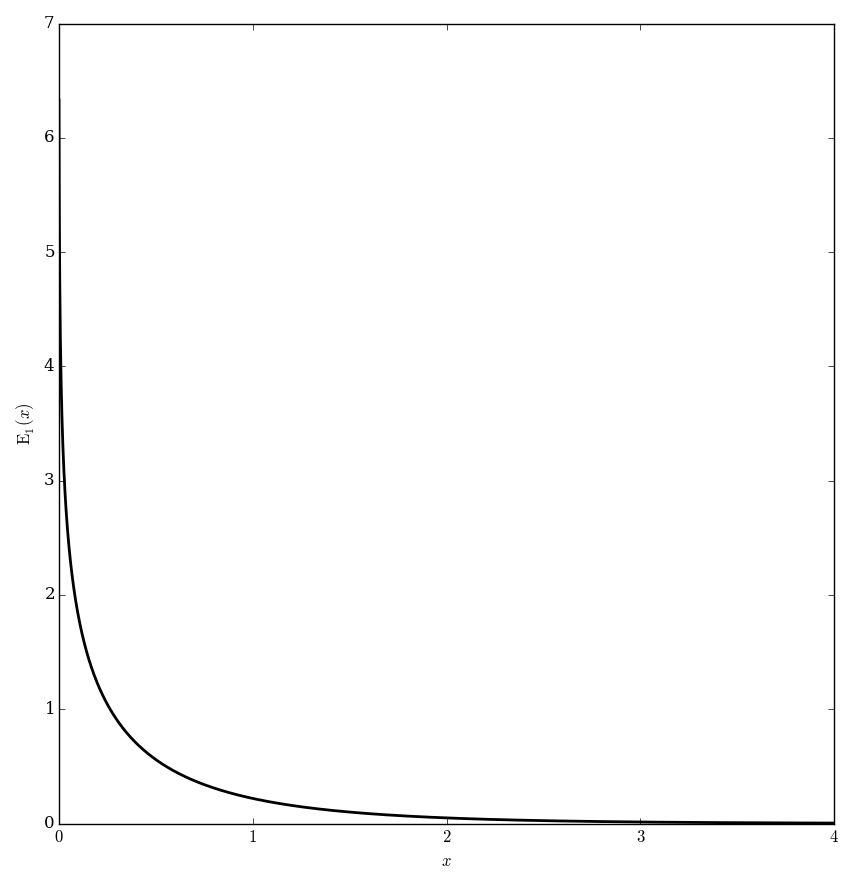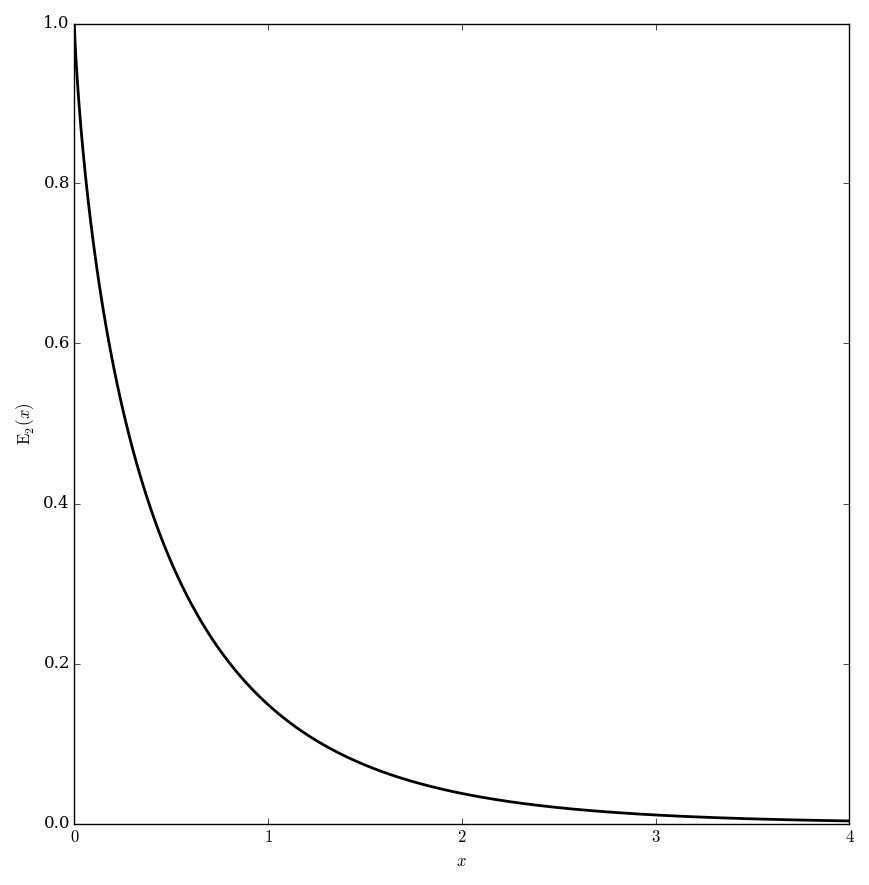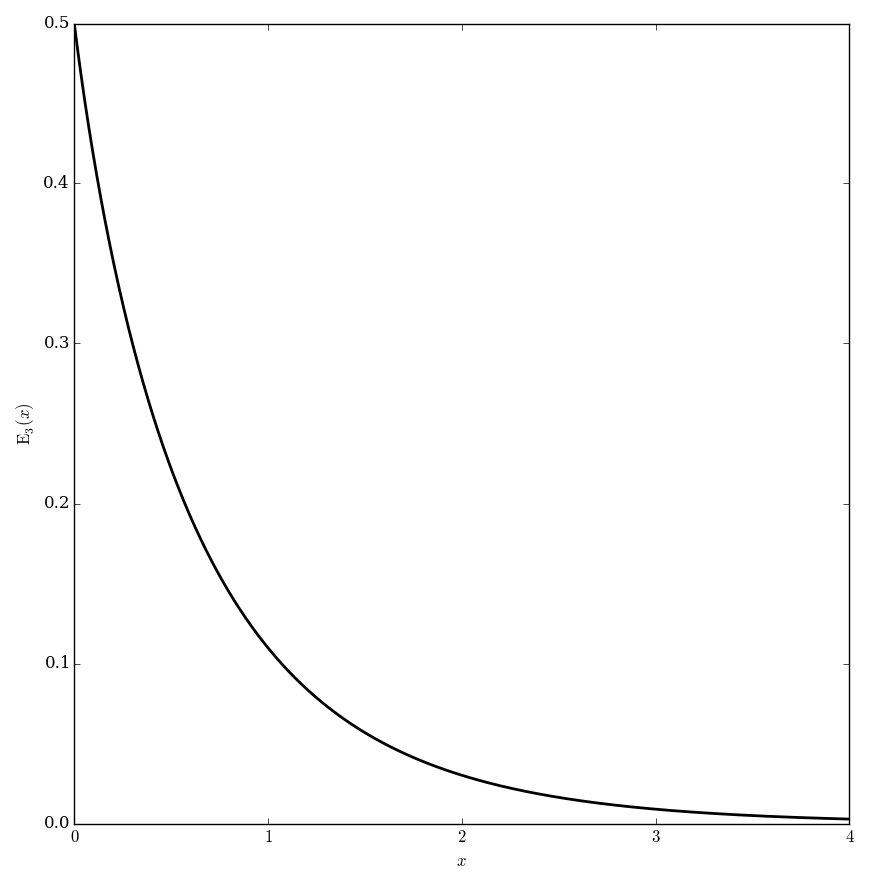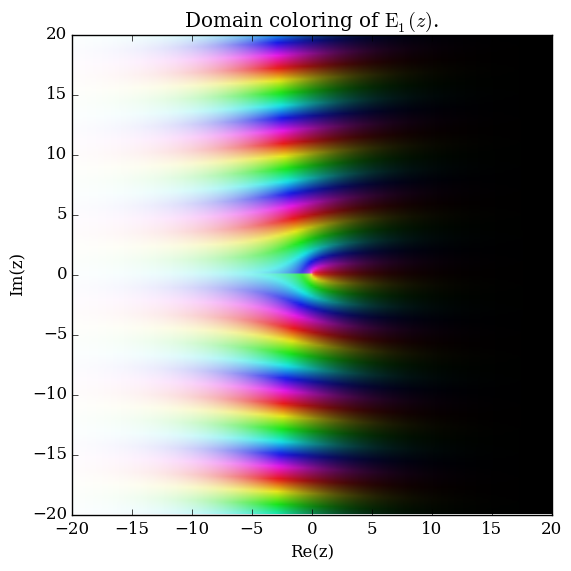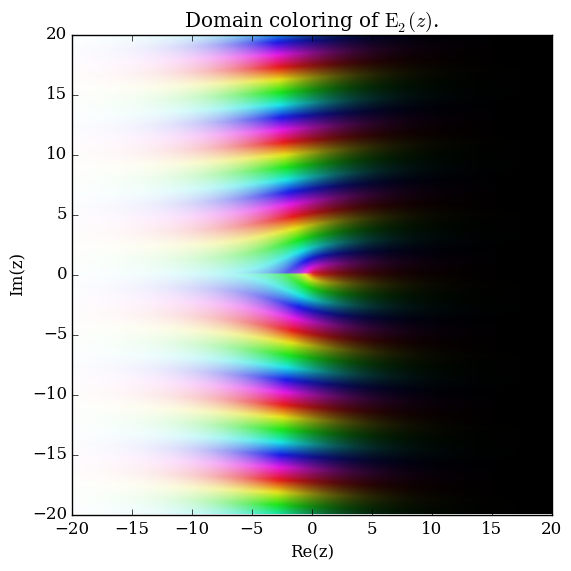Difference between revisions of "Exponential integral E"
From specialfunctionswiki
| (34 intermediate revisions by the same user not shown) | |||
| Line 1: | Line 1: | ||
| − | The exponential | + | __NOTOC__ |
| − | $$ | + | The exponential integral functions $E_n$ are defined for $\left|\mathrm{arg \hspace{2pt}}z\right|<\pi$ and $n=1,2,3,\ldots$ by |
| − | + | $$E_n(z)=\displaystyle\int_1^{\infty} \dfrac{e^{-zt}}{t^n} \mathrm{d}t.$$ | |
| − | |||
| − | $$E_n(z)=\displaystyle\int_1^{\infty} \dfrac{e^{-zt}}{t^n} | ||
| − | |||
| − | |||
| − | |||
| − | $$ | ||
| − | |||
| − | |||
| − | |||
| − | |||
| − | + | <div align="center"> | |
| − | + | <gallery> | |
| − | <div | + | File:E1plot.png|Graph of $\mathrm{E}_1$. |
| − | < | + | File:E2plot.png|Graph of $\mathrm{E}_2$. |
| − | $ | + | File:E3plot.png|Graph of $\mathrm{E}_3$. |
| − | + | File:Complexe1plot.png|[[Domain coloring]] of $\mathrm{E}_1$. | |
| − | + | File:Complexe2plot.png|[[Domain coloring]] of $\mathrm{E}_2$. | |
| − | + | </gallery> | |
| − | </ | ||
</div> | </div> | ||
| − | + | =Properties= | |
| − | + | [[Relationship between the exponential integral and upper incomplete gamma function]]<br /> | |
| − | + | [[Symmetry relation of exponential integral E]]<br /> | |
| − | + | [[Recurrence relation of exponential integral E]]<br /> | |
| − | < | ||
| − | </ | ||
| − | </ | ||
| − | + | =Videos= | |
| − | + | [https://www.youtube.com/watch?v=TppV_yDY3EQ Laplace transform of exponential integral (2 January 2015)]<br /> | |
| − | |||
| − | |||
| − | |||
| − | |||
| − | </ | ||
| − | + | =See Also= | |
| − | + | [[Exponential integral Ei]] | |
| − | |||
| − | |||
| − | |||
| − | |||
| − | |||
| − | + | =References= | |
| − | + | * {{BookReference|Handbook of mathematical functions|1964|Milton Abramowitz|author2=Irene A. Stegun|prev=findme|next=Ei(-x)=-Integral from -x to infinity of e^(-t)/t dt}}: $5.1.1$ (<i>note: this formula only defines it for $n=1$</i>) | |
| − | + | * {{BookReference|Handbook of mathematical functions|1964|Milton Abramowitz|author2=Irene A. Stegun|prev=findme|next=findme}}: $5.1.4$ (<i>note:</i> this formula defines it for $n=0,1,2,\ldots$) | |
| − | |||
| − | |||
| − | |||
| − | |||
| − | |||
| − | |||
| − | |||
| − | |||
| − | < | ||
| − | |||
| − | |||
| − | |||
| − | |||
| − | |||
| − | < | ||
| − | |||
| − | |||
| − | |||
| − | |||
| − | |||
| − | |||
| − | |||
| − | |||
| − | + | {{:*-integral functions footer}} | |
| − | |||
| − | + | [[Category:SpecialFunction]] | |
| − | [ | ||
Latest revision as of 00:45, 24 March 2018
The exponential integral functions $E_n$ are defined for $\left|\mathrm{arg \hspace{2pt}}z\right|<\pi$ and $n=1,2,3,\ldots$ by $$E_n(z)=\displaystyle\int_1^{\infty} \dfrac{e^{-zt}}{t^n} \mathrm{d}t.$$
Domain coloring of $\mathrm{E}_1$.
Domain coloring of $\mathrm{E}_2$.
Properties
Relationship between the exponential integral and upper incomplete gamma function
Symmetry relation of exponential integral E
Recurrence relation of exponential integral E
Videos
Laplace transform of exponential integral (2 January 2015)
See Also
References
- 1964: Milton Abramowitz and Irene A. Stegun: Handbook of mathematical functions ... (previous) ... (next): $5.1.1$ (note: this formula only defines it for $n=1$)
- 1964: Milton Abramowitz and Irene A. Stegun: Handbook of mathematical functions ... (previous) ... (next): $5.1.4$ (note: this formula defines it for $n=0,1,2,\ldots$)
